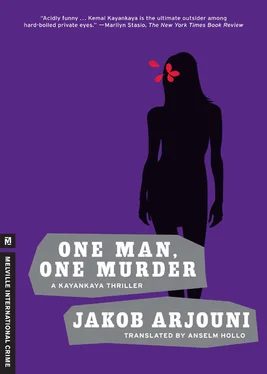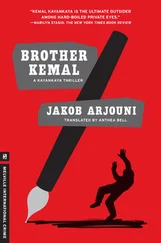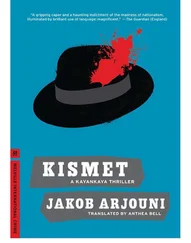Jakob Arjouni - One Man, One Murder
Здесь есть возможность читать онлайн «Jakob Arjouni - One Man, One Murder» весь текст электронной книги совершенно бесплатно (целиком полную версию без сокращений). В некоторых случаях можно слушать аудио, скачать через торрент в формате fb2 и присутствует краткое содержание. Жанр: Криминальный детектив, на английском языке. Описание произведения, (предисловие) а так же отзывы посетителей доступны на портале библиотеки ЛибКат.
- Название:One Man, One Murder
- Автор:
- Жанр:
- Год:неизвестен
- ISBN:нет данных
- Рейтинг книги:3 / 5. Голосов: 1
-
Избранное:Добавить в избранное
- Отзывы:
-
Ваша оценка:
- 60
- 1
- 2
- 3
- 4
- 5
One Man, One Murder: краткое содержание, описание и аннотация
Предлагаем к чтению аннотацию, описание, краткое содержание или предисловие (зависит от того, что написал сам автор книги «One Man, One Murder»). Если вы не нашли необходимую информацию о книге — напишите в комментариях, мы постараемся отыскать её.
One Man, One Murder — читать онлайн бесплатно полную книгу (весь текст) целиком
Ниже представлен текст книги, разбитый по страницам. Система сохранения места последней прочитанной страницы, позволяет с удобством читать онлайн бесплатно книгу «One Man, One Murder», без необходимости каждый раз заново искать на чём Вы остановились. Поставьте закладку, и сможете в любой момент перейти на страницу, на которой закончили чтение.
Интервал:
Закладка:
“Listen, Gina; Slibulsky told me he broke his arm because he fell downstairs. Do you happen to know what stairs?”
“In the whorehouse, of course.”
“That’s all he told you?”
“That’s all.”
“Mhm. And that legacy from the aunt in Berlin-what do you know about that?”
“What’s to know? He used it to pay off his debts. Why do you ask?”
“Oh, no particular reason.”
The rain sounded like a shower of golf balls against the glass walls of the phone booth. Around the booth, a small lake was forming.
“No, you see, I’m recommending him to my tax accountant, and the guy needs to know a few things about him … What kinds of debts were they?”
She made a pert puffing noise. “Just debts.”
“How much did he inherit?”
“Fifty thou.”
Now it was my turn to puff. “When did he get the money?”
“In January. But they withheld the tax before it was paid.”
“I see-well, then, I don’t suppose my accountant will be interested in that. Thanks, Gina, and let’s keep this to ourselves, O.K.? I want to make Slibulsky a present of a free advice session with my guy.”
“Gee, you must be rolling in it.”
“Well, at the moment … Talk to you soon.”
The sky was turning even darker. I stared into space for a while. Then I tore the door open and bounded across the puddles to my car. Mrs. Olga may have been an alarmist, but she did not hallucinate things.
8
Shortly after five-thirty I drove into Gellersheim. Ten minutes later I had located Rosenacker, a short street in the outskirts. It looked as if a couple of nouveau riches had decided to emulate the truly wealthy. The nameplates on the gates were too big, the driveways too small, and every villa looked different: some were perfectly round, others had Gothic arches or Bavarian-style carved wood curlicues. In front of an aerodynamic one-story building stood a gigantic flagpole: the flag bore the legend Theo Manz Cinema Production. A closer look revealed that the flag was plastic and that the garden gate had no handles. I was reminded of a movie type who had hired me to follow his future wife around for a week. He wanted to know if she was likely to waste his money in boutiques and bookshops. At the end of the assignment, he was unable to pay me because one of his projects had just collapsed. He told me that I should, nevertheless, be grateful for having made his acquaintance: he would gladly arrange a small part for me in his next movie. When I told him I didn’t want a part in a movie, only my fee, he said he was “somehow quite totally amazed,” as he put it. In style of speech and dress, this forty-year-old owner of a Volvo and a penthouse had an insatiable desire to give the impression of a high school student hitchhiking to the south. My fee arrived in dribs and drabs, a hundred marks a shot, at intervals corresponding to the times I saw him dining on red snapper and drinking bubbly in fashionable restaurants.
In its surroundings, Number Six looked pleasantly normal. The two-story brick box with a vine-covered terrace stood in a large well-kept garden with a pond and two driveways: one was hidden behind dog rose bushes, for staff and deliveries, the other was covered with light-colored gravel and bordered by roses and cast-iron carriage lights mounted on poles. Through the bars of the black iron gate I could see tire tracks. These were the only signs that anyone except for the gardener had been visiting here for a while. All the shutters were closed, the mailbox was full of advertising materials, and the moist glittering lawn looked undisturbed. I regretted that the thunderstorm was over. In the present radiant sunlight I had the unpleasant feeling of having my every move observed from a long way off. Nothing could remain hidden from Mrs. Olga whose neighboring villa with its little pink turrets looked like an American miniature copy of Heidelberg Castle.
The name on the mailbox was “Dr. Schelling.” I acted as if I had stopped at the wrong number and walked down the street past the staff entrance. After ten steps or so, I turned, ran back, jumped over the wooden fence and landed on a wire. Held up by plastic supports about three feet above ground it stretched all around the walls of the plot, ending in small gray boxes installed in the corners. I got up and took cover behind the nearest tree. Nothing happened. The alarm must have been turned off. Hunched over, I ran across flowerbeds, overturned a few pieces of garden furniture, reached the terrace, and pressed myself against the glass sliding door. Shielding my eyes with my hands I scanned the room inside and saw a couch, some chairs, a television set. As I slid to one side, the door slid open as well, to my surprise. After casting a quick glance all around, I went in.
Instead of the usual cold stale smell of furniture in vacant houses, I noticed an odor of stale cooking, with a lemony whiff of men’s perfume thrown in. I listened. A wall clock was ticking, a refrigerator humming somewhere in the distance. I touched the radiator. It had been turned off but was still warm. Then I noticed what I hadn’t been able to see from outside: the light was on in the entrance hall. I proceeded cautiously to the door, leaned against the doorframe, pulled my Beretta. Moving past a built-in kitchen and a toilet I reached the stairs. Halfway up the stairs I noticed, diagonally below me, a basement door. I tiptoed back, slipped the safety catch, and went down the steps to a large room furnished with a soccer game machine, a pinball machine, and a ten-meter-long dining table. On the table stood a huge tin bucket in the midst of some thirty plates with remnants of stew and bread on them. There was silverware on the floor, several chairs had been overturned; there were three more games on the pinball machine, and there was a ball in the chute. I walked across the room toward a curtain of gray blanket material. I pushed it aside and found myself in a narrow, yellow-lit hallway with doors to the right and the left. Each one of the rooms was some twenty-five square feet in size and furnished with three army cots, a sink, and the kind of light fixture you find in garages. Only the last room on the left contained something else.
He lay on his stomach, stripped down to his socks, and the gray skin on his arms was tattooed with images of women and weapons. He looked surprised. Under the mustache, his mouth was open, as if he wanted to say “But-?” or something like that. But he wasn’t saying anything, and he would never say anything again. His neck was broken.
I felt his pulse, then covered him with a blanket. I went through his clothes which lay scattered on the floor. There was no wallet or address book, only a box of matches, half a pack of cigarettes, and a nine-millimeter Browning pistol. I slipped the gun in my pocket, pulled the blanket off him again, and read the inscriptions on his arms: “Manne loves Ingrid”; “Manne loves Sabine”; “Manne loves Iris more than all the chicks before!”; and “Manne hates Tempo Hundred!” No last name. I sat down next to him and smoked two cigarettes. Then I went out into the garden behind the house, found a tool shed, took a shovel and dug a three-foot-deep pit next to a basement window. Then I took the cable of the electric lawnmower and went back to Manne. After I had wrapped him and his clothes into a huge sausage, I pulled him to the window and heaved and pushed him outside. A little later, I had covered the shallow grave so that it was invisible to the casual eye.
Then I checked out the house. I went through cupboards, chests, desks, nightstands, I even looked under the rugs, but didn’t come up with anything. Except for the basement, the house was like an empty furniture showroom. There were no letters, no books, there wasn’t even an old toothbrush. Only that stew and Manne, and a heap of vegetable scraps in the kitchen garbage can.
Читать дальшеИнтервал:
Закладка:
Похожие книги на «One Man, One Murder»
Представляем Вашему вниманию похожие книги на «One Man, One Murder» списком для выбора. Мы отобрали схожую по названию и смыслу литературу в надежде предоставить читателям больше вариантов отыскать новые, интересные, ещё непрочитанные произведения.
Обсуждение, отзывы о книге «One Man, One Murder» и просто собственные мнения читателей. Оставьте ваши комментарии, напишите, что Вы думаете о произведении, его смысле или главных героях. Укажите что конкретно понравилось, а что нет, и почему Вы так считаете.












